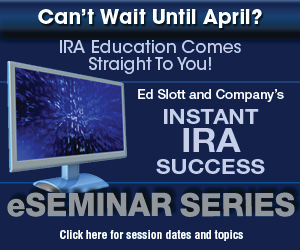The SEC (Securities and Exchange Commission) has recently issued an alert on self-directed IRAs and fraud risk (http://www.sec.gov/investor/alerts/sdira.pdf).
(Editor's Note: You can also watch a video with 5 actionable tips to help avoid fraud promoters by CLICKING HERE.)
They make the following points:
- Self-directed IRAs allow a broader range of investments, including real estate, tax lien certificates, private placement securities
- Self-directed IRA agreements specify that the financial institution only holds the IRA assets - they do not assume any responsibility for the legitimacy of the investment
- The characteristics of self-directed IRAs “makes them attractive targets for fraud promoters”
- The value of the asset may be that provided by the investment promoter and may not be the actual value of the asset when it is sold - if it can be sold
Their recommendations to investors follow (emphasis added):
- Avoid unsolicited investment offers
- Ask questions
- Be mindful of “guaranteed” returns
- Ask a professional
For additional educational information for investors, see the SEC’s Office of Investor Education and Advocacy’s homepage, the SEC’s Investor.gov website or NASAA’s investor education webpage.
For additional information related to avoiding fraud, also see:
For additional information regarding IRAs, please see the Internal Revenue Service’s IRA Online Resource Guide.
-By IRA Technical Consultant Beverly DeVeny and Jared Trexler



 Articles That Move
Articles That Move







0 comments:
Post a Comment